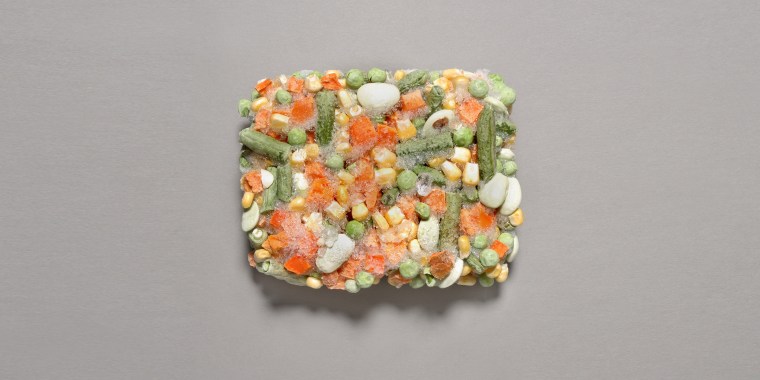You've probably heard a lot of so-called rules when it comes to frozen food.
For example, maybe you've been told that ice cream has gone bad once you see those crystals form or that you should never thaw and then refreeze meat.
But do you know which of those facts are true and which ones you can toss out ... along with that mystery meat that's been in the back of your freezer for five years?
For definitive answers to some common questions about keeping frozen food healthy and tasty, TODAY Food consulted two experts: chef Jennifer Stack, RDN, who teaches nutrition and food safety at the Culinary Institute of America, and Lauren Sucher, a press officer for the U.S. Food and Drug Administration (FDA).
Together, they've got answers to some of your most burning questions about everything frozen.
1. Is it OK to defrost food on my counter?
"Never thaw food at room temperature, such as on the counter top," advised Sucher. "Food must be kept at a safe temperature during thawing. That means leaving any raw poultry, raw beef or any other food you wouldn't leave sitting out on the counter is a bad idea.
"There are three safe ways to defrost food: in the refrigerator, in cold water and in the microwave. Food thawed in cold water or in the microwave should be cooked immediately."
2. How soon do I need to cook frozen food once I defrost it?
If you thawed the food in the refrigerator, you generally have between one to five days to cook it. "Once ground meat, stew meat, poultry or fish are thawed, cook them within a day or two," said Stack. "Red meat roasts and steaks can stay in your refrigerator for three to five days before you need to cook them."
3. Is it true that you shouldn't refreeze thawed food?
This is a common misconception, but the experts say that if you're still in the safe window for cooking and eating meat, poultry or fish, it's perfectly safe to refreeze them, provided that the foods were thawed in the refrigerator and kept cold (40°F or below). "Refreezing the food might result in undesirable changes in texture and some loss of flavor but it will be safe to eat," said Stack.
4. Does food keep indefinitely in the freezer?
Yes, but mostly no. "Frozen foods can be kept in your freezer indefinitely and still be safe to eat ... assuming they stayed frozen solid the whole time," said Stack. "However, they might not taste very good or have a strange texture that makes them unappealing." She said that fresh, whole roasts, steaks and whole chickens will keep their quality for up to a year, but once meats are cut into pieces, their quality freezer life drops to four to six months. Other meats, such as sausage, lose quality after just two months.
The FoodKeeper app is a super handy tool that gives timelines for freshness and quality for foods stored in the refrigerator and freezer. TODAY Health also has guidelines for how long you can freeze different foods.
5. What's the deal with those crystals on my ice cream?
Ice crystals form on food after that food has gotten warm and begun to defrost; then gets refrozen. "Once they get cold again, ice crystals start to form and the food (like ice cream) gets that off flavor and icy texture," explained Stack.
When you buy frozen food, choose packages that do not obviously have ice crystals, since this may indicate that the food has partially defrosted and then refrozen. For bagged frozen foods, give the bag a squeeze to test for freshness. "Frozen peas, corn, beans, berries and small pieces of fish like shrimp and scallops should not be a solid block of food," said Stack. "This may also be a sign of defrosting and refreezing for these foods."
6. How can I keep frozen foods at their best?
Make sure that frozen foods are wrapped well or in a tightly sealed container. And make sure to keep them cold. "Your frozen foods will keep their quality longer if they are kept in the coldest part of the freezer, such as the bottom or the back of the freezer," said Stack. "The side door storage areas usually get a little warmer so the food might soften or start to defrost."
7. What foods should I never freeze?
While you can safely freeze any food, some foods just don't freeze well. Stack's "don't freeze" list includes salad greens, meat salads made with mayonnaise (e.g. chicken salad), whole eggs and egg yolks and custard pies. So you're gonna have to eat that whole custard pie (or keep it in your fridge for up to five days). While you can freeze milk and cheese, "they may have some changes in their texture," said Stack.
8. Does freezing kill bacteria and other pathogens?
Sorry, nope. "Freezing food will not kill germs, but rather slow the growth," Sucher said. "If a food product is about to expire and you decide to freeze it, the day that you pull it out of the freezer for thawing will restart the clock where you stopped it upon freezing the food. Refrigerate or freeze perishables, prepared food, and leftovers within two hours."
9. If I lose power, should I toss all the food in my freezer?
Good news! The experts say "no" with some caveats. "If the power in your home goes out, keep the freezer door closed so the inside of the freezer stays as cold as possible," said Stack. Thawed or partially thawed foods that were in your freezer can be safely refrozen if the food has not gone above 40°F. You may see some changes in the quality of the food but it will still be safe to eat. Any food that has thawed and was above 40°F for more than two hours should be thrown out.
10. Is frozen food less nutritious than fresh food?
Nope, not at all! "The good news about frozen foods is they retain their nutritional value and may be higher in some vitamins than foods like vegetables that were harvested many days before you but them and eat them," said Stack.





